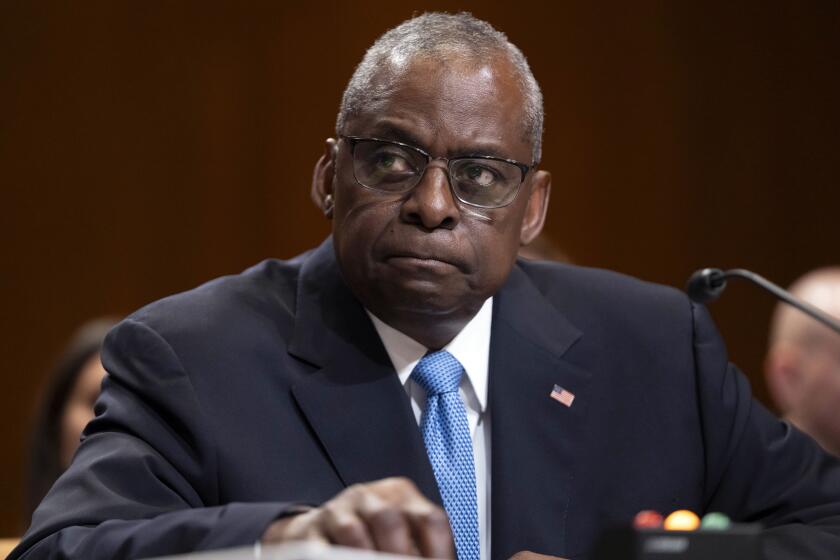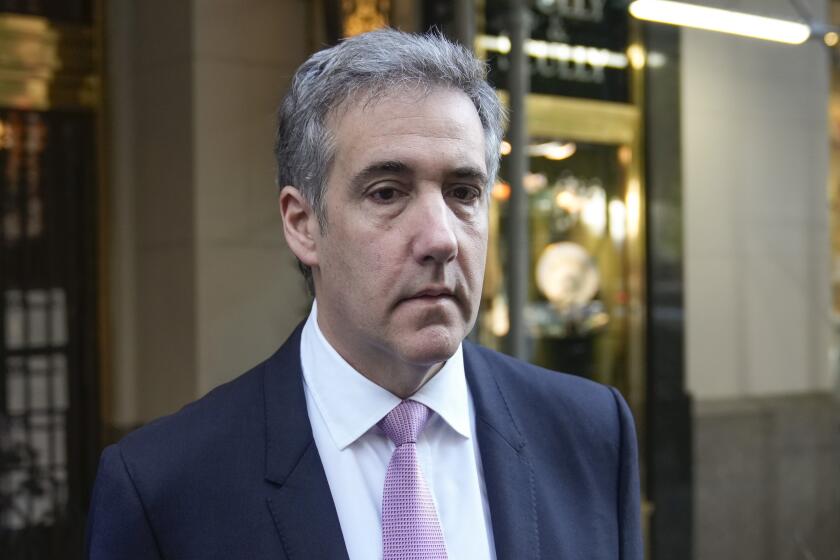Republicans Try to Clear Air Over Attempted Coup
In an emotional climax to weeks of political tumult, House Republican leaders went behind closed doors Wednesday night and apologized to rank-and-file party members for their handling of a failed conservative coup against Speaker Newt Gingrich (R-Ga.).
One top lieutenant, House Majority Whip Tom DeLay (R-Texas) for the first time publicly acknowledged that he told the rebels he would support their effort. The other leaders denied they had fomented the coup attempt but acknowledged they should have acted more quickly to quell the rebellion and inform the speaker of it.
Many Republicans attending the session, which lasted almost three hours, seemed inclined to accept their leaders’ apologies and to let them keep their leadership posts.
“We are resolved to forgive and forget,” said Rep. James C. Greenwood (R-Pa.). “It’s over. We needed the catharsis.”
“This has been one giant error of judgment,” said Rep. C.W. Bill Young (R-Fla.). “That has been resolved now.”
For his part, Gingrich was upbeat after the gathering broke up, terming it “fabulous.” He had scheduled it as he struggled to end the backstabbing and finger-pointing frenzy that has gripped the House GOP contingent since the aborted coup was disclosed last week.
“This discussion will be the end of the story,” Gingrich had declared before the meeting. “I will not allow another chapter to be written in this tiresome and overwrought saga.”
Gingrich also made it plain that he hopes to emerge from the imbroglio with a firmer grip on power. He told colleagues that henceforth there should be a “single line of authority” in the House that ends with him.
The closed-door session was demanded by angry rank-and-file Republicans who wanted three top Gingrich lieutenants--DeLay, House Majority Leader Dick Armey (R-Texas) and GOP Conference Chairman John A. Boehner (R-Ohio)--to explain whether they encouraged a small, rump group of conservatives to try to dump the speaker.
Rep. Bill Paxon (R-N.Y.) was also implicated in the scheme. He responded by resigning his post as chairman of the Republican leadership last week because, he said, his loyalty to Gingrich had been cast in doubt.
The dissident conservatives--who once lionized Gingrich as the architect of the strategy that helped the GOP seize control of Congress in 1994--have grown increasingly disenchanted with him. They view him as overly accommodating to the Clinton White House and worry that his leadership has been hamstrung by his negative ratings among voters.
Gingrich initially said he did not want to hold a party-wide meeting to discuss the flap, but he changed course after it became clear there were enough disgruntled lawmakers that they could, under GOP rules, force a get-together.
The session was convened in a tense atmosphere of uncertainty about where the discussions would lead. Lawmakers jammed into an unadorned meeting room in the basement of the Capitol. Outside the closed doors were thick crowds of reporters and congressional aides who were excluded from the members-only meeting. The usually dim hallways were bathed in television lights, and a bouquet of microphones awaited any lawmaker willing to come out and speak to the media.
Because each of the top four GOP leaders were involved in the controversy, the session was chaired by the fifth-ranking member of the leadership, GOP Conference Secretary Jennifer Dunn (R-Wash.).
Gingrich’s opening remarks included the reading of a biblical passage from the book of Romans: “Bless those who persecute you; bless and do not curse them.”
The other members of the leadership, as well as Paxon, then each offered their version of events. Lawmakers described the leaders’ initial presentations as matter-of-fact, lacking in recriminations and conciliatory. All but DeLay denied they had encouraged the rebels but admitted they had mishandled the rebellion.
“They failed to nip this thing in the bud quickly,” said Greenwood. “They spent too much time listening in a way that may have been interpreted as sympathetic.”
Paxon, in reference to his resignation from the leadership, urged members to put this behind them. “You have your head, enough’s enough,” Paxon was quoted as saying.
Before the meeting, there had been widespread speculation that DeLay would be the next to go, but he did not offer to resign in Wednesday’s meeting. Indeed, GOP sources said that conservative rebels had threatened to retaliate against other leaders if they tried to depose DeLay.
DeLay’s spokesman, John Feehery, confirmed for reporters that the Texan told Wednesday night’s gathering that he had, in a late-night meeting with the rebels earlier this month, said he would vote with them to oust Gingrich. But DeLay, in his comments to his colleagues, did not confirm reports that he had promised the rebels would have the support of other leaders as well.
Feehery said DeLay had not been motivated by a genuine desire to get rid of Gingrich and regretted saying what he did. “He was tired. He was trying to empathize with these members who had real frustrations,” Feehery said.
Although many rank-and-file members spoke, only one member of the rebel group--Rep. Linsey O. Graham (R-S.C.)--addressed the group. Rep. John T. Doolittle (R-Rocklin), another rebel, said after the meeting there was a “frank acknowledgment that there have been some frustrations.”
But Doolittle said that now “it is in our best interest that we pull together.”
Some members had wanted the discussion to be held earlier Wednesday, at the Republican conference’s regular weekly meeting. But Gingrich insisted that the morning meeting stay focused on the legislative progress of tax-cut and budget-balancing bills--cornerstones of the GOP agenda that are nearing completion and that, under normal circumstances, would be occupying most of the party leadership’s attention.
Many Republicans said they were hopeful that the party would emerge from the session better able to return to its legislative goals.
“It was conducive to looking forward and going forward together,” said Rep. Lamar S. Smith (R-Texas).
In the meeting’s wake, some members even suggested that Paxon be given his job back. But there was no immediate indication that would occur. Many members who have been openly dubious of the leaders’ past denials of involvement in the coup remained skeptical that the bitterness and distrust would dissipate quickly.
“Things never end around here, you know that,” said Rep. Ray LaHood (R-Ill.).
More to Read
Get the L.A. Times Politics newsletter
Deeply reported insights into legislation, politics and policy from Sacramento, Washington and beyond. In your inbox three times per week.
You may occasionally receive promotional content from the Los Angeles Times.







